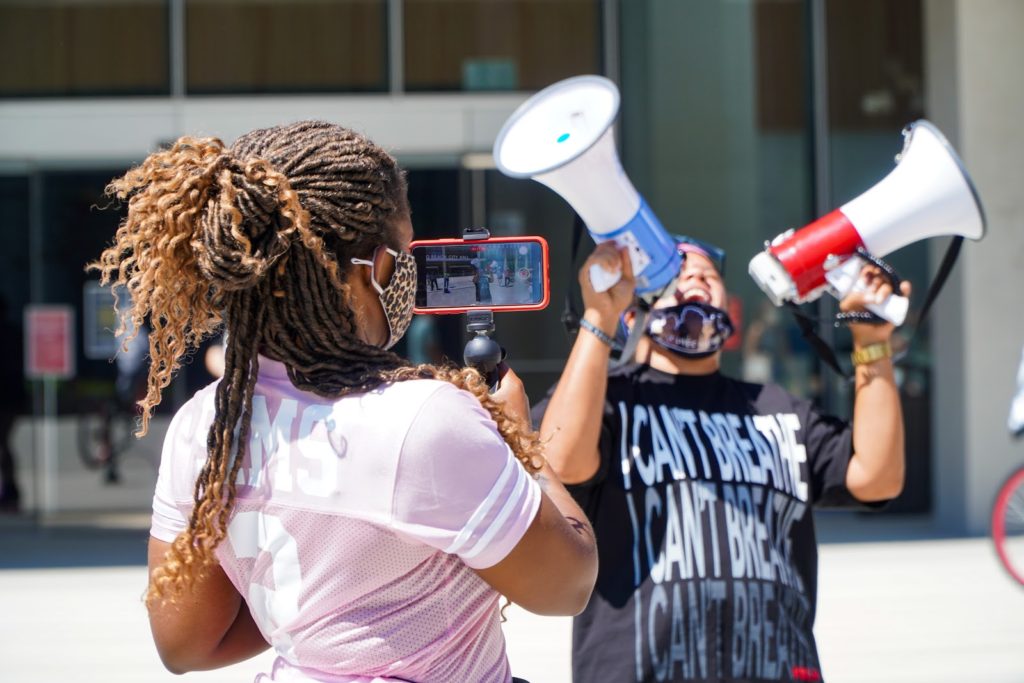Petition of Mayor Robert Garcia’s Recall is Ready to Sign
by Brigid McLaughlin, Contributor | Published July 31, 2020 in Journalism
7 minute readThe petition to recall Long Beach Mayor Robert Garcia is here. The campaign’s launch was celebrated on Sunday, starting with a march and ending at City Hall, where the petition was signed for the first time.
The following day, Garcia announced the death of his mother, Gabriella O’Donnell, due to complications from coronavirus.
“My brother and I are heartbroken. Our mother was the kindest and most compassionate person we’ve ever known,” Garcia tweeted on Monday.
The announcement put an immediate halt on the campaign’s promotion out of empathy for the mayor’s loss. Franklin Sims, one of the creators of LB Strong, which is leading the campaign against Garcia, asked supporters to also show compassion as a global pandemic and the fight for equality loom over the nation.
Sims noted Monday that the right thing to do is to come together as a city to support the mayor, even if residents may disagree with his policies, “It shows that we have to come together and really be there for one another even when we disagree. This is how we show that Long Beach is a different city, it is a different place.

“I get it, there are people out there who are residents of Long Beach who have lost family members and people that they love to injustices like police violence, none of that goes away because we’re showing love to our brother,” said Sims when addressing the mayor’s loss.
But the recall efforts won’t be postponed, and LB Strong is proceeding to help grant change in the city to those who want it. Pressure to defund the Long Beach Police Department has risen following the death of George Floyd and subsequent Black Lives Matter protests, causing some residents to push for the recall of Garcia, instead of asking for reform.
Tomisin Oluwole
Dine with Me, 2022
Acrylic on canvas
36 x 24 inches
Click here to check out our interview with Tomisin Oluwole, a literary and visual artist based in Long Beach.

Instead of gunking up our site with ads, we use this space to display and promote the work of local artists.

Currently under construction or approved by City Council: a new Olympic-size pool in Belmont Shores, a few state-of-the-art beachside concession stands, and a rising number of high-rises. Gentrification as a result of the new construction has left many residents who rent struggling for their rights, causing those pushing for Garcia’s ouster to question where his priorities lie.
In response to the petition, Garcia reputed his administration has worked to bring down crime, and reduce officer-involved shootings and use of force. He also claims to have “built and planned 4,000 new affordable and working-class homes across the city.”
Supporters of the recall lined up at Long Beach City Hall Sunday where Sims said, instead of a career politician, “The ideal mayor for Long Beach reflects our community and the principles that they are asking for now. Someone who’s going to stop gentrifying, someone who is not going to protect bad police officers.

Sims’ proposal to recall Garcia gets straight to the point—creating a platform for new leadership by taking Garcia’s title away altogether. “By raising the bar for Mayor Garcia, essentially, you raise the bar for all of council. This is about accountability. Recalling the mayor is about accountability,” Sims said at the event on Sunday.
LB Strong’s campaign is based on using registered voters to fight back and clean the slate: “I want to inspire the leaders to come out of Long Beach and say hey, now you can run for office,” says Sims. By signing the petition, residents of Long Beach who are able to vote, and who are over 18, can establish a long-term change in leadership instead of holding out hope for eventual reform to the mayor’s policies.
To print and sign the petition for Mayor Garcia’s recall, visit: moveourcity.org.

Help Us Create An Independent Media Platform for Long Beach
We believe that what we are trying to do here is not only unique, but constitutes a valuable community resource. We are dedicated to building a fiercely independent, not-for-profit, and non-hierarchical media organization that serves Long Beach. Our hope is that such a publication will increase civic participation, offer a platform to marginalized voices, provide in-depth coverage of our vibrant art scene, and expose injustices and corruption through impactful investigations. Mainly, we plan to continue to tell the truth, and have fun doing it. We know all this sounds ambitious, but we’re on our way there and making progress every day.
Here’s what we don’t believe in: our dominant local media being owned by one of the city’s wealthiest moguls or a far-flung hedge fund. We believe journalism must be skeptical and provide oversight. To do so, a publication should remain free from financial conflicts of interest. That means no sugar daddy or mama for us, but also no advertisements. We answer to no one except to our readers.
We call ourselves grassroots media not only because we are committed to producing work that is responsive to you, dear reader, but because in order for this project to continue we will also need your support. If you believe in our mission, please consider becoming a monthly donor—even a small amount helps!


 brig.mclaughlin@gmail.com
brig.mclaughlin@gmail.com




